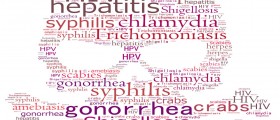
Getting tested for sexually transmittable diseases, which can be dangerous for a fetus and have long-lasting negative consequences on a baby is, in my opinion, something that no wannabe parent should miss out on. When's the best time to try for a baby? Regardless of all other factors, we say, after you are sure you don't have any sexually transmitted diseases.
Who should get tested for STDs?
Frankly, I think that everyone should get tested. Both men and women should get tested for diseases that are sexually transmitted, because STDs can easily pass from one partner to the other. You should get tested even if you have been in a mutually monogamous relationship for many years. Many STDs do not have any symptoms, or take a long time (sometimes many years) to get to the stage where you have symptoms. And you should get tested even if you were both virgins when you got together with your current partner, and you are sure that neither party has been unfaithful. Why? Trust is a lovely concept, but if your instincts were wrong, your future baby could be paying the price. Sexually transmittable diseases do not care if you are gay, straight, Christian, or have only had a one or two partners. They can happen to anyone who has ever had unprotected sex, and you are not exempt.
What diseases should you get tested for?
HIV testing and testing for Hepatitis B are the biggies. Everyone intending to get pregnant should also be tested for chlamydia and gonorrhea, which can both cause miscarriage, premature labor, pneumonia in newborns, and eye infections that can lead to blindness if left untreated. Genital warts should also be looked at, because they can be passed on to a baby and in rare cases cause problems with their lungs. You need to discuss which tests you should do with your healthcare provider, though. No test can reveal all STDs at once. While STD testing is recommended for all pregnant women, it is obviously better to know your infection before you get pregnant, so that you can seek treatment before you start trying to conceive or otherwise alter your plans accordingly.
- www.cdc.gov/std/pregnancy/stdfact-pregnancy.htm
- www.cdc.gov/preconception/men.html
- Photo courtesy of Wheeler Cowperthwaite by Flickr: www.flickr.com/photos/wcowperthwaite/5774698738/

















Your thoughts on this
Loading...